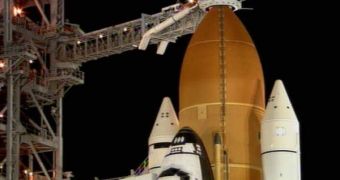NASA has just recently announced that the space shuttle Endeavor will not launch today (June 13th), because engineers found a fuel leak on one of its tanks. As a result, the launch will be delayed for at least 1 to 4 days, depending on how fast the team can get the damage fixed. To make matters worse, the adjacent complex at the Cape Canaveral Air Force Base is scheduled to host the launch of the LRO/LCROSS unmanned lunar vehicles on June 17th, and mission managers for both flights have to get together and discuss which of them is to go first. Endeavor has to take off until June 20th, otherwise it will have to wait until July 11th, before the International Space Station is in correct alignment again.
Initially scheduled to launch at 7:17 am EDT (1117 GMT) today, from Launch Pad 39A at the Kennedy Space Center, in Florida, the shuttle saw its flight STS-127 canceled at 12:26 am EDT (0426 GMT). The seven-astronaut crew had not dressed up or embarked the shuttle at that moment, but the strike to their morale must be intense, experts say. The leak was detected shortly after midnight, while the craft was being loaded with fuel for its flight. According to the NASA officials who announced the cancellation of the mission, it will take at least 4 days before Endeavor can be again prepared for flying.
However, four days from now (June 17th), the launch procedure will conflict with that of the lunar probes, LRO and LCROSS, which are scheduled to blast off for their orbits on the very same day. Discussions between the two groups of mission controllers will begin tomorrow, but, thus far, there's no telling what the result of the negotiations will be. “We haven't even begun to work that out. We'll start those negotiations tomorrow and see where we get,” said in a briefing the leader of the Endeavor mission management team, Mike Moses.
According to technicians, the leak was identified in the gaseous hydrogen tanks, and NASA has a very strict policy of not flying any shuttle sporting such a malfunction. The compound can easily ignite during the first moments of lift-off, and can cause a massive explosion, killing the astronauts and completely destroying the shuttle. This is not the first time mission engineers have to face such an event. This March, when Discovery was scheduled to launch on the STS-119 mission, the same fault occurred, but, while the problem was fixed, researchers don't yet know what caused it.
“The situation was almost identical to what we had two flows ago. It was discovered at almost identically the same time. It was eerily the same. Hydrogen is a very volatile commodity. It's a commodity you just don't mess with,” said in a statement Mike Leinbach, who is the shuttle launch director, quoted by Space.

 14 DAY TRIAL //
14 DAY TRIAL //